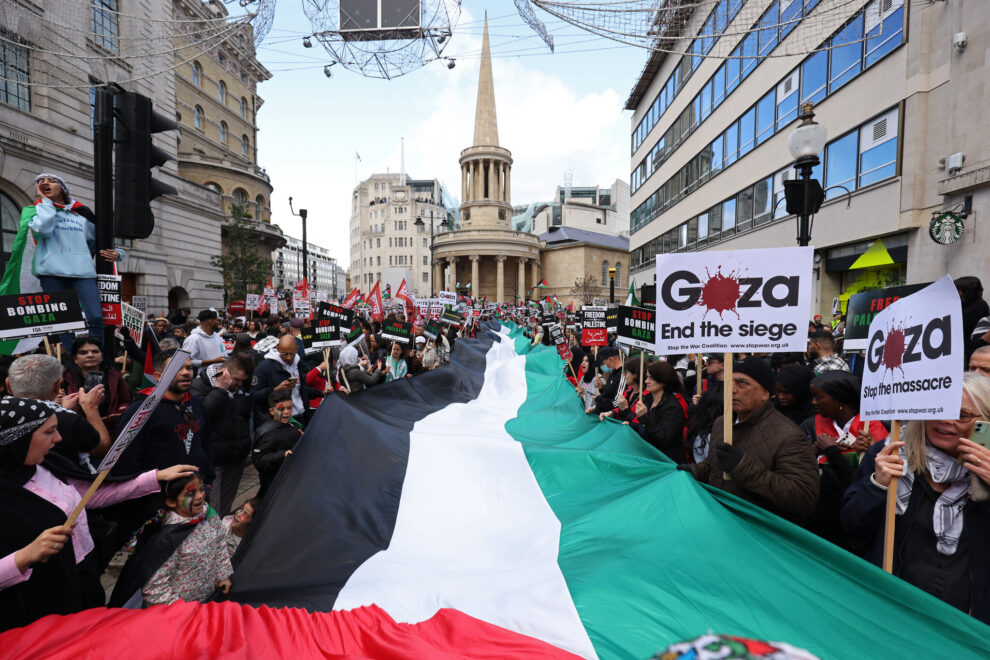Levi Salomon has been documenting anti-Semitic slogans and acts at rallies in Berlin for 25 years, but never had he experienced such virulent expressions of hate against Jews in post-war Germany until October 7.
On that Sabbath day, Hamas gunmen stormed across the border into Israel, killing 1,400 people, mostly civilians, in their homes, on the streets and at a rave party.
The most deadly attack since the founding of Israel had led it to declare war on Hamas, with Israeli forces heavily bombarding Gaza before sending in ground troops to destroy the Islamist movement. The Hamas-run health ministry said more than 10,000 people, mostly civilians, have been killed in the territory.
“October 7 marked a turning point” in the dimension of anti-Semitism in Germany almost 80 years after World War II, said Salomon. “There are hardly any taboos left.”
The public displays of hatred vary from people celebrating the Hamas attack by distributing sweets in a Berlin district with a large Arab population, to chants at demonstrations such as “from the river to the sea, Palestine will be free” — a slogan interpreted by some as a call for the destruction of Israel.
Islamist slogans like “the caliphate is the solution,” seen most recently at a protest in the western city of Essen, have also shocked Germany.
“I had not seen that before,” said Salomon.
– ‘Living in fear’ –
Anti-Semitism is rearing its head across the continent, with the European Commission warning that “European Jews today are again living in fear”.
In Germany, which is still atoning for the slaughter of more than six million Jews during the Holocaust, the trend is all the more alarming.
Holocaust denial is illegal in Germany, which has also stressed that its support for Israel’s existence is unconditional.
Felix Klein, the government’s anti-Semitism commissioner, said Tuesday that Germany had long seen itself as “world champions” in atoning for its genocidal past which had led to complacency.
“There was a notion that we were immune to anti-Semitism in large parts of the population,” he said, noting that the current threat came from both the far left as well as the extreme right.
Some 2,000 cases linked to the Israel-Hamas conflict have been reported so far, federal police said. Authorities have boosted security around Jewish institutions.
But that did not stop two men from flinging Molotov cocktails at a synagogue in Berlin. No one was hurt but the attack left many Jews in the capital rattled.
Vice Chancellor Robert Habeck made an impassioned plea on social media to fight anti-Semitism, calling in particular for an effort from far-left political movements and certain Muslim groups.
The current developments also lend greater resonance to Thursday’s ceremony commemorating the 85th anniversary of Kristallnacht, the November 9-10 pogrom by the Nazis.
Chancellor Olaf Scholz and President Frank-Walter Steinmeier are to lead the ceremony, along with president of the Central Council of Jews in Germany, Josef Schuster.
– Indoctrination –
Salomon emigrated from Russia in 1991, fleeing what he described as state-sponsored anti-Semitism.
He began in 1997 to compile records of anti-Semitic behaviour in Berlin and founded an association in 2008 that documents, analyses and makes his research public.
Demonstrations gathering extremists from both the right and left, as well as pro-Palestinians, are often where excesses can be witnessed, he said.
But Salomon said the pro-Palestinian gatherings since October 7 have been particularly virulent.
In Berlin, barricades were burned and police injured by stones and bottles thrown by protesters.
Salomon said he was particularly alarmed by the large number of youths and school pupils at the protests.
He recalls a phrase that he heard some children chanting in 2004 — “Knife in, knife out, knife red, the Jew is dead” and said: “Today, these children have become adults.”
Today’s children “continue to be indoctrinated,” he said.
Wearing a bullet proof vest and carrying a helmet, he turned up at a pro-Palestinian rally in central Berlin on a Saturday.
He said he had already been assaulted a few times while doing his work, and the dialogue that he seeks with the protesters sometimes turns sour.
This time, the march was mostly peaceful, with families making up the majority of protesters.
Salomon said it was completely legitimate to protest against the humanitarian catastrophe faced by Palestinians in Gaza.
“But I had hoped to see a poster or a sign condemning Hamas,” he said.
So far, he said, he hasn’t seen one.
Source : Yahoo















